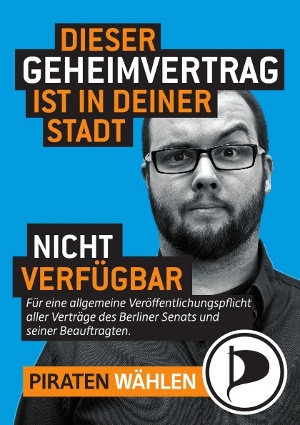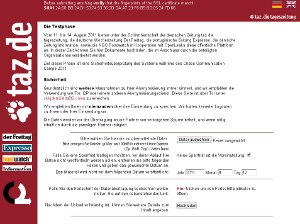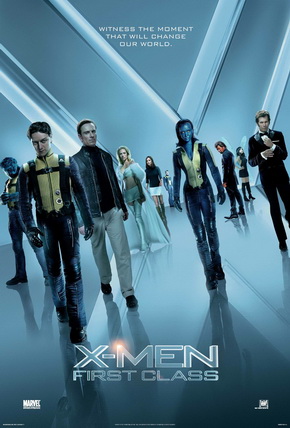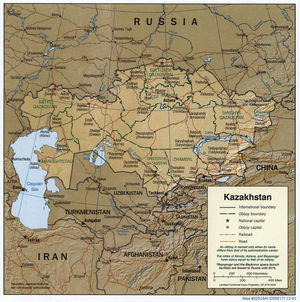Sunday, October 23. 2011
Heroin, Crack, Meth - alles legal - spinnen die?
Am Wochenende beschloss die Linkspartei einen Programmtext, in dem sie forderte, alle Drogen - darunter auch sogenannte "harte" Drogen wie Heroin oder Crack - zu legalisieren. Ziemlich viele Leute fanden das wohl keine gute Idee, wobei die sich meistens nicht die Mühe machen, irgendwelche Argumente vorzubringen.
Wozu auch? Wer sowas fordert, muss verrückt sein. Oder? Das sah auch die Führungsspitze der Linkspartei so und brachte noch auf dem selben Parteitag - erfolgreich - einen späten Änderungsantrag ein, der die Sache wieder relativierte. Man sei jetzt nur noch für eine »kontrollierte Abgabe«.
Dass es scheinbar für allzu viele als absolut selbstverständlich gilt, die Forderung nach einem Ende der Prohibitionspolitik für verrückt zu erklären - so selbstverständlich, dass es Argumente gar nicht mehr benötigt - ist bedauerlich. Deswegen möchte ich mich mal bemühen, das wichtigste geradezurücken.
Die härteste Droge ist Alkohol
Es lohnt sich ja gelegentlich, sich den aktuellen Stand der Wissenschaft zu vergegenwärtigen, wenn man über etwas diskutiert. Vielleicht bin ich da etwas naiv, aber ich denke Fakten sind einer Diskussion meist zuträglich.
Eine Studie zum Thema wurde etwa im November 2010 im britischen Fachjournal "The Lancet" veröffentlicht - ein Update einer vorigen Untersuchung von 2007. Hier gibt's einen Artikel des Guardian dazu. Darin versuchen die Autoren, die Gefährlichkeit verschiedener Drogen anhand von Kriterien einzusortieren und vergeben Punkte (mehr Punkte = Droge gefährlicher). In der Spitzengruppe rangieren Alkohol (72), Heroin (55) und Crack (54). Nicht uninteressant ist auch die restliche Einschätzung, die nicht gerade dem entspricht, was man allgemein denkt: Meth (33), Kokain (27), Tabak (26), Speed (23), Cannabis (20), GHB (18), Benzodiazepine (15), Ketamin (15), Methadon (13), Butane (10), Kath (9), Ecstasy (9), Annabolika (9), LSD (7), Buprenorphin (6) und Zauberpilze (5). Auffällig ist etwa, dass die Autoren Cannabis für gefährlicher als Ecstasy und LSD halten.
Die Studie ist übrigens kein Ausreisser - eine ähnliche Studie wurde etwa 1998 von der französischen Regierung in Auftrag gegeben. Die Ergebnisse unterscheiden sich zwar in der Einschätzung der "harmloseren" Drogen - anders als die Lancet-Studie sah man damals etwa die Gefahren von Cannabis als deutlich geringer an. Aber auch hier schätzte man Alkohol als eine der gefährlichsten Drogen ein.
Wenn also irgendjemand fordert, man müsse "harte" Drogen weiterhin verbieten und nur "weiche" Drogen legalisieren - Alkohol gehört in jedem Fall zu den "Harten". Nun fordert niemand ernsthaft das Verbot von Alkohol. In der ersten Hälfte des letzten Jahrhunderts probierten dies bekanntlich einige Staaten - unter anderem die USA.
Alkohol ist die mit Abstand am meisten und am selbstverständlichsten konsumierte Droge in unserer Gesellschaft. Keinen Alkohol zu trinken gilt als sonderbar (Randbemerkung: Ich trinke nahezu nie Alkohol - ich hab damit also Erfahrung).
Der Drogenkrieg kostet Menschenleben
Einer der blutigsten Konflikte auf der Welt ist zur Zeit der Drogenkrieg von Mexiko - obwohl dieser in den Medien kaum vorkommt. Seit einigen Jahren versucht die mexikanische Regierung massiv - mit Unterstützung der USA - Drogenproduktion und Handel mit Gewalt einzudämmen. Die LA Times berichtet von über 34.000 Toten zwischen 2006 und 2010. Das sind mehr als im Afghanistankrieg (wobei man bei dem Vergleich anmerken muss, dass natürlich auch im Afghanistankrieg Drogen eine Rolle spielen).
Man könnte noch mehr sagen. Etwa dazu, dass die meisten Drogentoten nicht an den Substanzen selbst, sondern an den Umständen (Verarmung, verunreinigte Drogen, Überdosierung mangels Informationen, AIDS durch gebrauchte Spritzen etc.) sterben. Dazu, dass es an anderer Stelle als selbstverständlich gilt, erwachsenen Menschen die Freiheit zuzugestehen, Risiken auf sich zu nehmen (ungesunde Ernährung, Extremsportarten). Heroin zu verbieten ist genauso plausibel wie das Verbot ungesunder Ernährung (mal wieder die unangenehmen Fakten: an letzterem sterben viel mehr Menschen).
Wozu auch? Wer sowas fordert, muss verrückt sein. Oder? Das sah auch die Führungsspitze der Linkspartei so und brachte noch auf dem selben Parteitag - erfolgreich - einen späten Änderungsantrag ein, der die Sache wieder relativierte. Man sei jetzt nur noch für eine »kontrollierte Abgabe«.
Dass es scheinbar für allzu viele als absolut selbstverständlich gilt, die Forderung nach einem Ende der Prohibitionspolitik für verrückt zu erklären - so selbstverständlich, dass es Argumente gar nicht mehr benötigt - ist bedauerlich. Deswegen möchte ich mich mal bemühen, das wichtigste geradezurücken.
Die härteste Droge ist Alkohol
Es lohnt sich ja gelegentlich, sich den aktuellen Stand der Wissenschaft zu vergegenwärtigen, wenn man über etwas diskutiert. Vielleicht bin ich da etwas naiv, aber ich denke Fakten sind einer Diskussion meist zuträglich.
Eine Studie zum Thema wurde etwa im November 2010 im britischen Fachjournal "The Lancet" veröffentlicht - ein Update einer vorigen Untersuchung von 2007. Hier gibt's einen Artikel des Guardian dazu. Darin versuchen die Autoren, die Gefährlichkeit verschiedener Drogen anhand von Kriterien einzusortieren und vergeben Punkte (mehr Punkte = Droge gefährlicher). In der Spitzengruppe rangieren Alkohol (72), Heroin (55) und Crack (54). Nicht uninteressant ist auch die restliche Einschätzung, die nicht gerade dem entspricht, was man allgemein denkt: Meth (33), Kokain (27), Tabak (26), Speed (23), Cannabis (20), GHB (18), Benzodiazepine (15), Ketamin (15), Methadon (13), Butane (10), Kath (9), Ecstasy (9), Annabolika (9), LSD (7), Buprenorphin (6) und Zauberpilze (5). Auffällig ist etwa, dass die Autoren Cannabis für gefährlicher als Ecstasy und LSD halten.
Die Studie ist übrigens kein Ausreisser - eine ähnliche Studie wurde etwa 1998 von der französischen Regierung in Auftrag gegeben. Die Ergebnisse unterscheiden sich zwar in der Einschätzung der "harmloseren" Drogen - anders als die Lancet-Studie sah man damals etwa die Gefahren von Cannabis als deutlich geringer an. Aber auch hier schätzte man Alkohol als eine der gefährlichsten Drogen ein.
Wenn also irgendjemand fordert, man müsse "harte" Drogen weiterhin verbieten und nur "weiche" Drogen legalisieren - Alkohol gehört in jedem Fall zu den "Harten". Nun fordert niemand ernsthaft das Verbot von Alkohol. In der ersten Hälfte des letzten Jahrhunderts probierten dies bekanntlich einige Staaten - unter anderem die USA.
Alkohol ist die mit Abstand am meisten und am selbstverständlichsten konsumierte Droge in unserer Gesellschaft. Keinen Alkohol zu trinken gilt als sonderbar (Randbemerkung: Ich trinke nahezu nie Alkohol - ich hab damit also Erfahrung).
Der Drogenkrieg kostet Menschenleben
Einer der blutigsten Konflikte auf der Welt ist zur Zeit der Drogenkrieg von Mexiko - obwohl dieser in den Medien kaum vorkommt. Seit einigen Jahren versucht die mexikanische Regierung massiv - mit Unterstützung der USA - Drogenproduktion und Handel mit Gewalt einzudämmen. Die LA Times berichtet von über 34.000 Toten zwischen 2006 und 2010. Das sind mehr als im Afghanistankrieg (wobei man bei dem Vergleich anmerken muss, dass natürlich auch im Afghanistankrieg Drogen eine Rolle spielen).
Man könnte noch mehr sagen. Etwa dazu, dass die meisten Drogentoten nicht an den Substanzen selbst, sondern an den Umständen (Verarmung, verunreinigte Drogen, Überdosierung mangels Informationen, AIDS durch gebrauchte Spritzen etc.) sterben. Dazu, dass es an anderer Stelle als selbstverständlich gilt, erwachsenen Menschen die Freiheit zuzugestehen, Risiken auf sich zu nehmen (ungesunde Ernährung, Extremsportarten). Heroin zu verbieten ist genauso plausibel wie das Verbot ungesunder Ernährung (mal wieder die unangenehmen Fakten: an letzterem sterben viel mehr Menschen).
Posted by Hanno Böck
in Politics
at
17:25
| Comments (0)
| Trackbacks (0)
Defined tags for this entry: alkohol, cannabis, crack, drogen, heroin, linkspartei, meth, prohibition
Monday, October 10. 2011
Anti-virus applications and the Bundestrojaner
 Two days ago, the german Chaos Computer Club (CCC) published a sample that's supposedly a variant of a german state spy software (the so-called "Bundestrojaner").
Two days ago, the german Chaos Computer Club (CCC) published a sample that's supposedly a variant of a german state spy software (the so-called "Bundestrojaner").You might wonder if your anti virus software is protecting you. The webpage Virus Total lets you upload suspicious files, scans them with 43 different anti virus applications and presents you the result. Currently, 24 of 43 scanners detect the Bundestrojaner.
The CCC provides some further information where they state that the file they released is not the original one - they had several samples that differed and to avoid detection of the potential source, they changed the differing parts to something completely else. You might wonder if your anti virus app also detects the "original" Bundestrojaner and not just the modified file the CCC released.
We can easily check this if we change the modified pieces again to something else. A modified variant lowered the detection rate to 14 of 43 - amongst them the popular McAffee software. Now, it's pretty useless to only detect the exact published sample of a malware if we know that the original malware is different.
| Application | Version | Sig date | Modified sample | Original CCC sample |
|---|---|---|---|---|
| AhnLab-V3 | 2011.10.08.01 | 2011-Okt-09 | Trojan/Win32.R2d2 | Trojan/Win32.R2d2 |
| AntiVir | 7.11.15.175 | 2011-Okt-09 | TR/GruenFink.1 | TR/GruenFink.1 |
| Antiy-AVL | 2.0.3.7 | 2011-Okt-09 | - | - |
| Avast | 6.0.1289.0 | 2011-Okt-09 | Win32:Trojan-gen | Win32:Trojan-gen |
| AVG | 10.0.0.1190 | 2011-Okt-07 | - | - |
| BitDefender | 7.2 | 2011-Okt-10 | Backdoor.R2D2.A | Backdoor.R2D2.A |
| ByteHero | 1.0.0.1 | 2011-Sep-23 | - | - |
| CAT-QuickHeal | 11.00 | 2011-Okt-07 | - | - |
| ClamAV | 0.97.0.0 | 2011-Okt-10 | Trojan.BTroj-1 | Trojan.BTroj-1 |
| Commtouch | 5.3.2.6 | 2011-Okt-10 | - | W32/R2D2.A |
| Comodo | 10407 | 2011-Okt-10 | - | Backdoor.Win32.R2D2.A |
| DrWeb | 5.0.2.03300 | 2011-Okt-10 | - | - |
| Emsisoft | 5.1.0.11 | 2011-Okt-10 | Trojan.Win32.Bundestrojaner!A2 | Backdoor.Win32.R2D2!IK |
| eSafe | 7.0.17.0 | 2011-Okt-06 | - | - |
| eTrust-Vet | 36.1.8605 | 2011-Okt-07 | - | - |
| F-Prot | 4.6.2.117 | 2011-Okt-09 | - | W32/R2D2.A |
| F-Secure | 9.0.16440.0 | 2011-Okt-10 | Backdoor:W32/R2D2.A | Backdoor:W32/R2D2.A |
| Fortinet | 4.3.370.0 | 2011-Okt-10 | - | W32/R2D2.A!tr.bdr |
| GData | 22 | 2011-Okt-10 | Backdoor.R2D2.A | Backdoor.R2D2.A |
| Ikarus | T3.1.1.107.0 | 2011-Okt-10 | - | Backdoor.Win32.R2D2 |
| Jiangmin | 13.0.900 | 2011-Okt-09 | - | - |
| K7AntiVirus | 91155258 | 2011-Okt-08 | - | - |
| Kaspersky | 9.0.0.837 | 2011-Okt-09 | Backdoor.Win32.R2D2.a | Backdoor.Win32.R2D2.a |
| McAfee | 5.400.0.1158 | 2011-Okt-10 | - | Artemis!930712416770 |
| McAfee-GW-Edition | 2010.1D | 2011-Okt-09 | - | Artemis!930712416770 |
| Microsoft | 17702 | 2011-Okt-10 | Backdoor:Win32/R2d2.A | Backdoor:Win32/R2d2.A |
| NOD32 | 6529 | 2011-Okt-10 | Win32/R2D2.A | Win32/R2D2.A |
| Norman | 6.7.2011 | 2011-Okt-09 | - | - |
| nProtect | 2011-10-10.01 | 2011-Okt-10 | - | - |
| Panda | 10.0.3.5 | 2011-Okt-09 | - | Suspiciousfile |
| PCTools | 8.0.0.5 | 2011-Okt-10 | Backdoor.R2D2 | Backdoor.R2D2 |
| Prevx | 3.0 | 2011-Okt-10 | - | - |
| Rising | 23.78.06.02 | 2011-Okt-09 | - | - |
| Sophos | 4.70.0 | 2011-Okt-10 | Troj/BckR2D2-A | Troj/BckR2D2-A |
| SUPERAntiSpyware | 4.40.0.1006 | 2011-Okt-08 | - | - |
| Symantec | 20111.2.0.82 | 2011-Okt-10 | Backdoor.R2D2 | Backdoor.R2D2 |
| TheHacker | 6.7.0.1.318 | 2011-Okt-09 | - | - |
| TrendMicro | 9.500.0.1008 | 2011-Okt-09 | - | - |
| TrendMicro-HouseCall | 9.500.0.1008 | 2011-Okt-10 | - | BKDR_R2D2.A |
| VBA32 | 3.12.16.4 | 2011-Okt-07 | - | - |
| VIPRE | 10718 | 2011-Okt-10 | - | Trojan.Win32.Generic!BT |
| ViRobot | 2011.10.10.4710 | 2011-Okt-10 | - | - |
| VirusBuster | 14.1.3.0 | 2011-Okt-09 | - | - |
Scans done Monday morning around 8:00.
Posted by Hanno Böck
in Computer culture, English, Politics, Security
at
20:05
| Comments (0)
| Trackbacks (0)
Saturday, October 8. 2011
Free rar unpacking code
One of the few pieces of non-free software I always needed on my system is a rar unpacker. Despite that there are very good free alternatives for high-compression archivers like 7-zip or tar.xz, many people seem to like relying on a proprietary format like rar and it's in widespread use.
Years ago, someone came up with a GPLed rar unpacker, but sadly, that was never updated to support the rar version 3 format. Its development is stalled.
For that reason, some time back I suggested to the Free Software Foundation to add a free rar unpacking tool to their list of high priority projects - they did so. Happily I recently read that they've removed it. There's The Unarchiver now, based on an old amiga library. It supports a whole bunch of formats - including rar v3. It's mainly a MacOS application, but it also provides a command line tool that can be compiled in Linux.
It needs objective C, the gnustep-base libraries and it took me some time to get it to compile properly. For the Gentoo-users: I already committed an ebuild, just run "emerge unar".emerge TheUnarchiver
Update: Changed ebuild name to unar, as that's the name upstream uses for the command line version now.
Years ago, someone came up with a GPLed rar unpacker, but sadly, that was never updated to support the rar version 3 format. Its development is stalled.
For that reason, some time back I suggested to the Free Software Foundation to add a free rar unpacking tool to their list of high priority projects - they did so. Happily I recently read that they've removed it. There's The Unarchiver now, based on an old amiga library. It supports a whole bunch of formats - including rar v3. It's mainly a MacOS application, but it also provides a command line tool that can be compiled in Linux.
It needs objective C, the gnustep-base libraries and it took me some time to get it to compile properly. For the Gentoo-users: I already committed an ebuild, just run "emerge unar".emerge TheUnarchiver
Update: Changed ebuild name to unar, as that's the name upstream uses for the command line version now.
Wednesday, September 21. 2011
Der Papst
 Der Papst kommt nach Berlin. Das dürfte jedem, der die Medien verfolgt, nicht entgangen sein. Morgen wird seine Heiligkeit die Hauptstadt aufsuchen und eine Rede mit teilweise leeren Bänken im Bundestag abhalten.
Der Papst kommt nach Berlin. Das dürfte jedem, der die Medien verfolgt, nicht entgangen sein. Morgen wird seine Heiligkeit die Hauptstadt aufsuchen und eine Rede mit teilweise leeren Bänken im Bundestag abhalten.Was schreibt man zu so einem Anlass? Ich meine Papst kritisieren ist ja irgendwie so ein bisschen wie Scientology kritisieren - weiß eh jeder der es wissen möchte. Nun ja, die taz brachte doch tatsächlich das Kunststück fertig, gestern den Sexismus in der Piratenpartei anzuprangern und heute einen Artikel zur Verteidigung von Joseph Kardinal Ratzinger zu bringen. Eine Quote für katholische Priester wurde darin nicht gefordert. Manche Leute fangen auch plötzlich an, angesichts des Besuchs seiner Heiligkeit und der Tatsache, dass sich einige die Frechheit erlauben, das nicht gut zu finden, zu fragen, warum man denn ausgerechnet dann sein Demonstrationsrecht wahrnehmen muss, wenn das Objekt des Protests gerade da ist.
Aber eigentlich ziehe ich schon jetzt zum Papstbesuch ein relativ optimistisches Fazit: Vor ein paar Jährchen (6 Jahre ist das schon her, ich bloggte schon damals) machte sich Ratzinger auf nach Köln zu einem Event namens Weltjugendtag, an dem ihm Schaaren von Jüngern zu Füßen lagen. Von Protesten hat man damals nichts mitbekommen. Das ist heute anders. Das ist schön.
Terminhinweis: Donnerstag, 22.September (morgen), 16:00 Uhr, Potsdamer Platz, Demonstration gegen die menschenfeindliche Geschlechter- und Sexualpolitik des Papstes
Update: Nett war's. Und ich muss mich ganz furchtbar entschuldigen, meine Erinnerungen waren unzureichend. Es gab auch damals beim Weltjugendtag Proteste.
Monday, September 19. 2011
Thesen zum Wahlerfolg der Piratenpartei
 Zugegeben, es ist nicht sonderlich originell, am Tag nach dem überraschenden Wahlerfolg der Piratenpartei (8,9 Prozent nach letzten ARD-Hochrechnungen) darüber zu schreiben, aber ich sinniere gerade über zwei Thesen, die ich gern teilen würde.
Zugegeben, es ist nicht sonderlich originell, am Tag nach dem überraschenden Wahlerfolg der Piratenpartei (8,9 Prozent nach letzten ARD-Hochrechnungen) darüber zu schreiben, aber ich sinniere gerade über zwei Thesen, die ich gern teilen würde.Das Thema Transparenz und die Bedeutung des Berliner Wasservolksentscheids wurde total unterschätzt
Vielleicht ein kleiner Rückblick: Im Frühjahr gab es in Berlin einen Volksentscheid zur Offenlegung der Verträge über die Privatisierung der Berliner Wasserverträge. Bemerkenswert daran ist, dass es der erste erfolgreiche Volksentscheid Berlins war und das, obwohl es keine wirklich namhaften Unterstützer gab.
Die Grünen haben das Volksbegehren damals mitgetragen, aber die Piraten waren die einzigen, die das Thema in den Wahlkampf getragen haben.
Die Forderung "Transparenz", ja, die Tatsache, dass man als Bürger, egal wie man zu einem Thema steht, wenigstens wissen will, was Sache ist, ist total populär - und das ist auch richtig so.
Die Grünen hätten den Aufstieg der Piratenpartei vollständig verhindern können, wenn sie sich dem Thema "Netzpolitik" ernsthaft angenommen hätten
Erstmal eine Binsenweisheit: Traditionell gibt es in dem Spektrum, in dem die Piratenpartei erfolgreich ist, eine relativ große Sympathie für die Grünen. Nicht wenige prominente Netzaktivisten sind Grünenmitglieder.
Trotzdem scheint man sich dort verdammt schwer zu tun, sich dieser Themen anzunehmen. In der Vergangenheit hat man beispielsweise dem sogenannten "Hackerparagraphen" und den diversen Urheberrechtskörben von Brigitte "was ist ein Browser?" Zypries zugestimmt und tat sich verdammt schwer mit einer klaren Positionierung zum Zensurthema. Mir würden auf Anhieb eine Reihe von Namen einfallen, die ein grünes Parteibuch haben und netzpolitisch kompetent wären, aber von denen sitzt keiner im Bundestag.
Ein paar weitere Thesen ohne nähere Ausführung:
- Die Piraten wird von ihren Anhängern weder als Ein-Themen- noch als Protestpartei wahrgenommen, insofern greift jede Kritik in diese Richtung ins leere.
- Die Piraten sind in Berlin mit einem, ich sag mal, modern-linken Programm erfolgreich gewesen (beispielsweise Thema Grundeinkommen). Sie täten gut daran, diejenigen in den eigenen Reihen, die versuchen, neoliberaler als die FDP zu sein, nicht zu beachten (erinnert sich noch jemand an Aaron König?)
- Jetzt drüber zu diskutieren ob dieser Wahlsieg eine Eintagsfliege oder ein neuer Trend ist halte ich für Kaffeesatzleserei.
- Die Menge an inhaltlichen Plakaten der Piraten und das Fehlen solcher bei den anderen Parteien (am extremsten hat es da die SPD getrieben) hat sicher viele Menschen angesprochen.
- Zu guter letzt: Den Piraten wäre zu empfehlen, nicht jede Kritik der Form "das ist aber unrealistisch/unfinanzierbar" ernst zu nehmen. So weit weg ist die Idee eines kostenlosen Nahverkehrs in einer Stadt, in der über 100 Menschen wegen Schwarzfahren im Knast sitzen, nicht.
Monday, September 12. 2011
Einweg oder Mehrweg?
 Ich habe hier gerade zwei leere Bio-Zitronensaftflaschen. Die eine ist von Alnatura, die andere von Voelkel. Auf der Alnatura-Flasche ist deutlich "ohne Pfand" zu lesen, auf der Voelkel-Flasche "Für die Umwelt - Mehrweg" (siehe Foto).
Ich habe hier gerade zwei leere Bio-Zitronensaftflaschen. Die eine ist von Alnatura, die andere von Voelkel. Auf der Alnatura-Flasche ist deutlich "ohne Pfand" zu lesen, auf der Voelkel-Flasche "Für die Umwelt - Mehrweg" (siehe Foto). Nur sind beide Flaschen bis auf das Etikett komplett identisch. Beide haben sogar eine identische Eingravierung am Boden: "어 ε - 0,2l 21,2 - E48". Insofern könnte man sich für die "kein Pfand"-Flasche von Alnatura vermutlich auch Pfand holen.
Nur sind beide Flaschen bis auf das Etikett komplett identisch. Beide haben sogar eine identische Eingravierung am Boden: "어 ε - 0,2l 21,2 - E48". Insofern könnte man sich für die "kein Pfand"-Flasche von Alnatura vermutlich auch Pfand holen.Ich hab mal an Alnatura und Voelkel geschrieben, ob sie mir das aufklären können. Ich berichte hier, wenn ich etwas erfahre.
Update:
Antwort von Alnatura:
Wir verkaufen den Alnatura Zitronensaft nicht nur in unseren Alnatura Super Natur Märkten, sondern auch über unsere Handelspartner wie beispielsweise dm-drogerie markt. Aus logistischen Gründen unserer Handelspartner gab es zu der aktuellen Verpackung (Einwegflasche) leider keine Alternative.
Wir verfolgen einen ständigen Verbesserungsprozess und geben Ihre Rückmeldung zu Mehrwegflaschen gerne auch an die zuständigen Kollegen aus dem Produktmanagement zur Prüfung weiter. Bitte haben Sie jedoch Verständnis dafür, dass wir Ihnen aufgrund der Vielzahl an Kundenanregungen keine Rückmeldung darüber geben können, ob und wann Ihr Wunsch umgesetzt wird.
Antwort von Völkel:
Die Voelkel Flasche ist definitiv eine Pfandflasche. Die Alnatura Flasche ist zwar dieselbe, wird aber aus irgendwelchen Gründen (vermutlich Logistische Gründe) nicht als solche benutzt, sondern als Einwegflasche.
Bei der Antwort von Alnatura hatte ich ein bisschen das Gefühl, dass sie meine Frage nicht wirklich gelesen hatten. So richtig schlau werde ich daraus jetzt auch nicht...
Sunday, September 11. 2011
Michael S. Hart was a true visionary
 Michael S. Hart, the founder of Project Gutenberg, died some days ago.
Michael S. Hart, the founder of Project Gutenberg, died some days ago.Project Gutenberg, if you don't know, is a webpage collecting electronic books online. It was founded in 1971 (yes, long before the Internet as we know it today existed), when Hart typed the Declaration of Independency on a Xerox mainframe. Hart can be seen as the inventor of electronic books - 40 years ago.
We're still waiting for ebooks to get into mainstream. Currently, ebook reading devices are available, but their usage is not widespread yet. But I'm almost certain that ebooks will become very important within the next years. Hart had that opinion 40 years ago.
Today, Project Gutenberg has about 36.000 books. Most of them are public domain, because their copyright expired. There are other similar projects today: Wikisource is a sister project of Wikipedia and archive.org has a lot of scanned books, including most of the public domain books digitalized by Google.
Some mission statements for Project Gutenberg from Michael S. Hart (taken from Wikipedia) I find that sum up things very well:
"Encourage the Creation and Distribution of eBooks"
"Help Break Down the Bars of Ignorance and Illiteracy"
"Give As Many eBooks to As Many People As Possible"
Posted by Hanno Böck
in Books, Computer culture, Copyright, English
at
19:03
| Comment (1)
| Trackbacks (0)
Friday, September 9. 2011
Morgen Freiheit statt Angst: Auf die Straße!
Morgen findet die inzwischen schon traditionell zu nennende jährliche Demonstration „Freiheit statt Angst“ in Berlin statt. Seit 2007 gehen jährlich tausende Menschen unter diesem Motto für Datenschutz und digitale Bürgerrechte auf die Straße. Los geht es um 13:00 Uhr am Pariser Platz (Brandenburger Tor).

Angesichts der aktuellen Auseinandersetzungen – im Moment ist ja wieder die Vorratsdatenspeicherung ganz hoch im Kurs – möchte ich hier die Gelegenheit nutzen, zur Teilnahme aufzurufen.
Und für alle, denen Berlin zu weit ist, sei hier auch nochmals darauf verwiesen, dass zur Zeit eine Petition gegen die Wiedereinführung der Vorratsdatenspeicherung beim Bundestag läuft – die bislang leider mit etwa 20.000 Unterstützern noch nicht so gut läuft wie sie sollte. Aber es gibt auch gute Nachrichten: Einer Umfrage zu Folge spricht sich die Mehrheit der Bundesbürger gegen eine anlasslose Speicherung von Kommunikationsdaten aus.
 Einen Kritikpunkt möchte ich hier aber noch loswerden. Im vergangenen Jahr wurde die Demonstration von übermäßig vielen 9/11-Verschwörungstheoretikern heimgesucht – das ging so weit, dass ein englischsprachiger Artikel die Situation so darstellte, als sei es insgesamt eine Protestaktion von Verschwörungstheoretikern gewesen (was Unfug ist, es war eine Handvoll unter Tausenden). Einen ähnlich gelagerten Fall gab es bereits 2008 in Köln, als eine Datenschutzdemo von einer christlichen Sekte geradezu okkupiert wurde. Angesichts dieser Vorgeschichte finde ich es mehr als unglücklich, ausgerechnet Esoqueen Nina Hagen zur diesjährigen Demonstration einzuladen. Die hat nämlich zu HAARP und UFOs auch eher interessante Ansichten und ist mir bislang nicht durch intelligente politische Analysen aufgefallen.
Einen Kritikpunkt möchte ich hier aber noch loswerden. Im vergangenen Jahr wurde die Demonstration von übermäßig vielen 9/11-Verschwörungstheoretikern heimgesucht – das ging so weit, dass ein englischsprachiger Artikel die Situation so darstellte, als sei es insgesamt eine Protestaktion von Verschwörungstheoretikern gewesen (was Unfug ist, es war eine Handvoll unter Tausenden). Einen ähnlich gelagerten Fall gab es bereits 2008 in Köln, als eine Datenschutzdemo von einer christlichen Sekte geradezu okkupiert wurde. Angesichts dieser Vorgeschichte finde ich es mehr als unglücklich, ausgerechnet Esoqueen Nina Hagen zur diesjährigen Demonstration einzuladen. Die hat nämlich zu HAARP und UFOs auch eher interessante Ansichten und ist mir bislang nicht durch intelligente politische Analysen aufgefallen.
Aber nichtsdestotrotz: Die Themen sind verdammt wichtig, die Gegenseite schläft nicht. Also: Morgen auf die Straße!

Angesichts der aktuellen Auseinandersetzungen – im Moment ist ja wieder die Vorratsdatenspeicherung ganz hoch im Kurs – möchte ich hier die Gelegenheit nutzen, zur Teilnahme aufzurufen.
Und für alle, denen Berlin zu weit ist, sei hier auch nochmals darauf verwiesen, dass zur Zeit eine Petition gegen die Wiedereinführung der Vorratsdatenspeicherung beim Bundestag läuft – die bislang leider mit etwa 20.000 Unterstützern noch nicht so gut läuft wie sie sollte. Aber es gibt auch gute Nachrichten: Einer Umfrage zu Folge spricht sich die Mehrheit der Bundesbürger gegen eine anlasslose Speicherung von Kommunikationsdaten aus.
 Einen Kritikpunkt möchte ich hier aber noch loswerden. Im vergangenen Jahr wurde die Demonstration von übermäßig vielen 9/11-Verschwörungstheoretikern heimgesucht – das ging so weit, dass ein englischsprachiger Artikel die Situation so darstellte, als sei es insgesamt eine Protestaktion von Verschwörungstheoretikern gewesen (was Unfug ist, es war eine Handvoll unter Tausenden). Einen ähnlich gelagerten Fall gab es bereits 2008 in Köln, als eine Datenschutzdemo von einer christlichen Sekte geradezu okkupiert wurde. Angesichts dieser Vorgeschichte finde ich es mehr als unglücklich, ausgerechnet Esoqueen Nina Hagen zur diesjährigen Demonstration einzuladen. Die hat nämlich zu HAARP und UFOs auch eher interessante Ansichten und ist mir bislang nicht durch intelligente politische Analysen aufgefallen.
Einen Kritikpunkt möchte ich hier aber noch loswerden. Im vergangenen Jahr wurde die Demonstration von übermäßig vielen 9/11-Verschwörungstheoretikern heimgesucht – das ging so weit, dass ein englischsprachiger Artikel die Situation so darstellte, als sei es insgesamt eine Protestaktion von Verschwörungstheoretikern gewesen (was Unfug ist, es war eine Handvoll unter Tausenden). Einen ähnlich gelagerten Fall gab es bereits 2008 in Köln, als eine Datenschutzdemo von einer christlichen Sekte geradezu okkupiert wurde. Angesichts dieser Vorgeschichte finde ich es mehr als unglücklich, ausgerechnet Esoqueen Nina Hagen zur diesjährigen Demonstration einzuladen. Die hat nämlich zu HAARP und UFOs auch eher interessante Ansichten und ist mir bislang nicht durch intelligente politische Analysen aufgefallen.Aber nichtsdestotrotz: Die Themen sind verdammt wichtig, die Gegenseite schläft nicht. Also: Morgen auf die Straße!
Posted by Hanno Böck
in Computer culture, Politics
at
18:58
| Comments (0)
| Trackbacks (0)
Defined tags for this entry: bürgerrechte, datenschutz, freiheitstattangst, ninahagen, verschwörungstheorien, vorratsdatenspeicherung
Monday, September 5. 2011
Vortragsfolien zu Wirtschaftswachstum und Stromsparen
Auf dem eben zu Ende gegangenen Klimacamp im rheinischen Braunkohlerevier habe ich zwei Vorträge gehalten und stelle hier die Vortragsfolien zur Verfügung. Web 2.0-Kompatibel gibt's die Folien auch auf Slideshare
Vortragsfolien "Wirtschaftswachstum" als ODP, als PDF und Online auf Slideshare
Vortragsfolien "Stromsparen" als ODP, als PDF und Online auf Slideshare
Der erste Vortrag baut teilweise auf alten Folien auf, die ich vor knapp 1,5 Jahren genutzt hatte.
Vortragsfolien "Wirtschaftswachstum" als ODP, als PDF und Online auf Slideshare
Vortragsfolien "Stromsparen" als ODP, als PDF und Online auf Slideshare
Der erste Vortrag baut teilweise auf alten Folien auf, die ich vor knapp 1,5 Jahren genutzt hatte.
Posted by Hanno Böck
in Ecology, Life
at
19:19
| Comments (2)
| Trackbacks (0)
Defined tags for this entry: klima, klimacamp, slides, strom, stromsparen, wachstum, wirtschaftswachstum
Sunday, August 21. 2011
The sad state of the Linux Desktop
 Some days ago it was reported that Microsoft declared it considers Linux on the desktop no longer a threat for its business. Now I usually wouldn't care that much what Microsoft is saying, but in this case, I think, they're very right – and thererfore I wonder why this hasn't raised any discussions in the free software community (at least I haven't seen one – if it has and I missed it, please provide links in the comments). So I'd like to make a start.
Some days ago it was reported that Microsoft declared it considers Linux on the desktop no longer a threat for its business. Now I usually wouldn't care that much what Microsoft is saying, but in this case, I think, they're very right – and thererfore I wonder why this hasn't raised any discussions in the free software community (at least I haven't seen one – if it has and I missed it, please provide links in the comments). So I'd like to make a start.A few years ago, I can remember that I was pretty optimistic about a Linux-based Desktop (and I think many shared my views). It seemed with advantages like being able to provide a large number of high quality applications for free and having proven to be much more resilient against security threats it was just a matter of time. I had the impression that development was often going into the right direction, just to name one example freedesktop.org was just starting to try to unify the different Linux desktop environments and make standards so KDE applications work better under GNOME and vice versa.
Today, my impression is that everything is in a pretty sad state. Don't get me wrong: Free software plays an important role on Desktops – and that's really good. Major web browsers are based on free software, applications like VLC are very successful. But the basis – the operating system – is usually a non-free one.
I recently was looking for netbooks. Some years ago, Asus came out with the Eee PC, a small and cheap laptop which ran Linux by default – one year later they provided a version with Windows as an alternative. Today, you won't find a single Netbook with Linux as the default OS. I read more often than not in recent years that public authorities trying to get along with Linux have failed.
I think I made my point; the Linux Desktop is in a sad state – I'd like to discuss why this is the case and how we (the free software community) can change it. I won't claim that I have the definite answer for the cause. I think it's a mix of things, I'd like to start with some points:
- Some people seem to see Desktop environments more as a playground for creative ideas than something other people want to use on a daily basis in a stable way. This is pretty much true for KDE 4 – the KDE team abandoned a well-working Desktop environment KDE 3.5 for something that isn't stable even today and suffers from a lot of regressions. They permanently invent new things like Akonadi and make them mandatory even for people who don't care about them – I seriously don't have an idea what it does, except throwing strange error messages at me. I switched to GNOME, but what I heard about GNOME 3 doesn't make me feel that it's much better there (I haven't tested it yet and I hope that, unlike the KDE-team, GNOME learns from that and supports 2.x until version 3 is in a state working equally well). I think Ubuntu's playing with the Unity Desktop go in the same direction: We found something cool, we'll use it, we don't care that we'll piss of a bunch of our users. In contrast to that, I have the impression that what I named above – the idea that we can integrate different desktop environments better by standards – isn't seen as important as it used to be. (I know this part may provoke flames, I hope this won't hide the other points I made)
- The driver problem. I still encounter it to be one of the biggest obstacles and it hasn't changed a bit for years. You just can't buy a piece of hardware and use it. It usually is “somehow possible”, but the default is that it requires a lot of extra geeky work that the average user will never manage. I think there's no easy solution to that, as it would require cooperation from hardware vendors (and with diminishing importance of the Linux Desktop this is likely getting harder). But a lot of things are also self-made. In 2006, Eric Raymond wrote an essay how crappy CUPS is – I think it hasn't improved since then. How often have I read Ubuntu bug reports that go like this: “My printer worked in version [last version], but it doesn't work in [current version]” - “Me too.” - “Me too.” - “Me too” - no reply from any developer. One point that this shares with the one above is the caring about regressions, which I think should be a top priority, but obviously, many in the free software community don't seem to think so. (if you don't know the word: something is called a regression if something worked in an older version of a software, but no longer works in the current version)
- The market around us has changed. Back then, we were faced with a “Windows or nothing” situation we wanted to change to a “Windows or Linux” situation. Today, we're faced with “Windows or MacOS X”. Sure, MacOS existed back then, but it only got a relevant market share in recent years (and many current or former free software developers use MacOS X now). Competition makes products better, so Windows today is not Windows back then. Our competitors just got better.
- The desktop is loosing share. This is a point often made, with mobile phones, tablets, gaming consoles and other devices taking over tasks that were done with desktop computers in the past. This is certainly true for some degree, but I think it's also often overestimated. Desktop computers still play an important role and I'm sure they will continue to do so for a long time. The discussion how free software performs on other devices (and how free Android is) is an interesting one, too, but I won't go into it for now, as I want to talk about the Desktop here.
Okay, I've started the discussion, I'd like others to join. Please remember: It's not my goal to flame or to blame anyone – my goal is to discuss how we can make the Linux desktop successful again.
Friday, August 12. 2011
OpenLeaks doing strange things with SSL
 OpenLeaks is a planned platform like WikiLeaks, founded by ex-Wikileaks member Daniel Domscheit-Berg. It's been announced a while back and a beta is currently presented in cooperation with the newspaper taz during the Chaos Communication Camp (where I am right now).
OpenLeaks is a planned platform like WikiLeaks, founded by ex-Wikileaks member Daniel Domscheit-Berg. It's been announced a while back and a beta is currently presented in cooperation with the newspaper taz during the Chaos Communication Camp (where I am right now).I had a short look and found some things noteworthy:
The page is SSL-only, any connection attempt with http will be forwarded to https. When I opened the page in firefox, I got a message that the certificate is not valid. That's obviously bad, although most people probably won't see this message.
What is wrong here is that an intermediate certificate is missing - we have a so-called transvalid certificate (the term "transvalid" has been used for it by the EFF SSL Observatory project). Firefox includes the root certificate from Go Daddy, but the certificate is signed by another certificate which itself is signed by the root certificate. To make this work, one has to ship the so-called intermediate certificate when opening an SSL connection.
The reason why most people won't see this warning and why it probably went unnoticed is that browsers remember intermediate certificates. If someone ever was on a webpage which uses the Go Daddy intermediate certificate, he won't see this warning. I saw it because I usually don't use Firefox and it had a rather fresh configuration.
There was another thing that bothered me: On top of the page, there's a line "Before submitting anything verify that the fingerprints of the SSL certificate match!" followed by a SHA-1 certificate fingerprint. Beside the fact that it's english on a german page, this is a rather ridiculous suggestion. Checking a fingerprint of an SSL connection against one you got through exactly that SSL connection is bogus. Checking a certificate fingerprint doesn't make any sense if you got it through a connection that was secured with that certificate. If checking a fingerprint should make sense, it has to come through a different channel. Beside that, nowhere is explained how a user should do that and what a fingerprint is at all. I doubt that this is of any help for the targetted audience by a whistleblower platform - it will probably only confuse people.
Both issues give me the impression that the people who designed OpenLeaks don't really know how SSL works - and that's not a good sign.
Posted by Hanno Böck
in Computer culture, Cryptography, English, Security
at
17:26
| Comments (6)
| Trackbacks (2)
Saturday, July 30. 2011
Using EFF SSL Observatory to find weak keys in CAcert

(c) EFF, Creative Commons by
I did some checks on the all_certs table selecting the certificates from cacert. I found out that there were 143 valid certificates with 512 bit. That is completely insecure and breakable by a home computer today. I also found that the majority of certificates still has 1024 bit, which by today's standards should be considered harmful - there have been no public breaks yet, but it's expected that it's possible to build an RSA-1024 cracker for an attacker with enough money.
I did the following query on the database:
SELECT RSA_Modulus_Bits, count(*) FROM all_certs WHERE `Validity:Not After datetime` > '2010-03-08' AND ( `Issuer` like '%CAcert.org%' OR `Issuer` like '%cacert.org') GROUP BY `RSA_Modulus_Bits` ORDER BY count(*);
+------------------+----------+
| RSA_Modulus_Bits | count(*) |
+------------------+----------+
[...]
| 512 | 143 |
| 4096 | 632 |
| 2048 | 3716 |
| 1024 | 5790 |
+------------------+----------+
Now, what further checks can we do? I checked for the RSA exponent. I found two certificates in the database with exponent 3. RSA with low exponent is also considered insecure, although one has to state that this is not a serious issue. RSA with low exponents is not insecure by itself, but it can create vulnerabilities in combination with other issues (if you're interested in details, read my diploma thesis).
I have not checked the CAcert database for the Debian SSL vulnerability, as that would've been non-trivial. There were scripts shipped with the SSL Observatory data, but I found them not easy to use, so I skipped that part.
My suggestions to cacert were to revoke all certificates with serious issues (like the 512 bit certificates). Also, I suggested that new certificates with insecure settings like RSA below 2048 bits or a low exponent should not be allowed. CAcert did most of this. By now, all 512 bit certificates should be revoked and it is impossible to create new ones below 1024 bit or with low exponents. It is however still possible to create 1024 bit certificates, which is due to a limitation in the client certificate creation script for the Internet Explorer. They say they're working on this and plan to prevent 1024 bit certificates in the future. They also told me that they've checked for the Debian SSL bug.
I've reported the issue on the 11th March and got a reply on the same day - that's pretty okay, one slight thing still: There was no security contact with a PGP key listed on the webpage (but I got a PGP-encrypted contact once I asked for it). That's not good, I expect especially from a security project that I can contact them for security issues with encrypted mail. One can also argue if four months is a bit long to fix such an issue, but as it was far away from being trivial, this can be apologized.
I'd say that I'm quite satisfied with the reactions of CAcert. I always got fast replies to questions I had and the issues were resolved in a proper way. I have other points of criticism on the security of CAcert, the issue that bothers me most is that they still use SHA-1 and refuse to switch to a more secure hashing algorithm like SHA-512, although all major browsers have support for this since a long time.
I want to encourage others to do further tests on CAcert. I'd like to see CAcert being an authority that does better than the commercial ones. The database from the observatory is a treasure and should be used by projects like CAcert to improve their security.
Friday, July 29. 2011
Behind the great firewall
 When thinking about China, probably many people associate this with censorship.
When thinking about China, probably many people associate this with censorship.On my trip, I had the chance to see the infamous great firewall from the inside. I haven't done any deeper analysis, but I'll share some thinkgs I've observed. A couple of famous sites (for example Twitter, Flickr) are blocked. Contrary to what many people may believe, webpages that are often associated with Warez (Rapidshare, Pirate Bay) were also blocked. The situation with Wikipedia was mixed. Most of the time, I could read the texts on Wikipedia, but access to the image servers was blocked. At the end of our trip, I couldn't access Wikipedia any more.
I encountered no blocks on less famous sites, although I regularly surf sites that could be labelled politically controversial. Though this probably doesn't tell much, except that the chinese authorities are not very interested in blocking european websites.
Interesting may be that the blocking works on an IP level. DNS resolution of blocked sites still works, but you cannot ping the IPs. I haven't extensively tried to circumvent the censorship, as I had no pressing need for it. The only thing I tried was an SSH tunnel, but that usually wasn't possible as the connection never was fast and reliable enough for a stable SSH session.
Most Hotels and Hostels provide Internet access - but most of them by cable. Usually, in other countries today this is done via wireless lan. My theory on that is that a cable-based Internet access makes it easier to log activity associated to a specific person (you always have to show your passport when you check into a Hotel). But still, we had anonymous Internet access (both wireless and cable) at a few places.
Another thing I'd like to mention is what the (non-technical) censorship did with me. I knew that in China people cannot just write a blog, they need some kind of license for it. I was very unsure what this means for me as a forein traveller. I came to the conclusion that I likely won't get any trouble if I just write about my trip without touching any controversial topics. Although I hadn't planned to write anything, this was always in my mind and probably influenced my writings. There was one time where I self-censored myself. In the entry about Hong Kong, I originally had this part, which I removed before publishing:
Most notably it is a place where free speech is possible to a much higher degree than in mainland China. This makes it a very important place for political discussion about China in general. We saw chinese dissident groups that had their information tables and spread leaflets around the Kowloon harbour.
Not much and I luckily have the opportunity to publish it now.
Posted by Hanno Böck
in English, Life, Politics
at
11:46
| Comment (1)
| Trackbacks (0)
Defined tags for this entry: asia, censorship, china, greatfirewall, hongkong, travel, trip2011, zensur
Wednesday, July 20. 2011
Film review: X-Men - First Class
 Recently, a new X-Men movie made it to the cinemas. I quite liked the first three X-Men movies. I wasn't very impressed by the prequel-movie Wolverine, which tells the story of one of the characters.
Recently, a new X-Men movie made it to the cinemas. I quite liked the first three X-Men movies. I wasn't very impressed by the prequel-movie Wolverine, which tells the story of one of the characters.Now there's X-Men first class. Again a prequel, but from a different perspective. Wolverine only has a very short cameo appearance, this time the movie telling the story of many other X-Men characters. Prequels are difficult. They must tell a story that already has some fixed points and a fixed outcome that's already known my most viewers. The new X-Men film suffers exactly from that problems.
The movie does a very brave task - it tries not only to tell a prequel story to the other movies, it also involves a whole bunch of historic events. From the nazi concentration camps to nuclear weapons and the cuba crisis. This sounds like too much for a science fiction movie, but surprisingly it handles this part not so bad. It even motivated me to improve my history knowledge and read something about Argentinia's role in hiding nazis after the second world war (some german information here). It seems the movie is pretty close to real history in that respect.
But there's another problem in this movie. I found the main plot just doesn't fit. And that's due to the fact its a prequel where the outcome is already decided:
(please stop reading here if you haven't seen the movie and still want to see it - spoilers ahead)
The development of the charakter Erik Lensherr alias Magneto. As the victim of some cruel experiments by a mad Nazi scientist, his life is one of anger and revenge. But his opponent - and all viewers of the other X-Men movies already know that - has a role which is exactly what Magneto's role will be later. So in the end, he kills him - and then just replaces him. All allies of his biggest enemy just become allies of him. That just doesn't make sense.
(now you can read again)
All in all, it's still a pretty good movie. If you like such movies, it has its moments. But the in my opinion illogical story destroys a lot.
Final word: We had two X-Men prequels now. But X-Men 3 ended with a perfect cliffhanger. It should be resolved at some point - I'd like to see X-Men 4.
Posted by Hanno Böck
in English, Movies
at
12:38
| Comments (0)
| Trackbacks (0)
Defined tags for this entry: argentinia, cinema, cubacrisis, magneto, movie, nazi, prequel, xmen, xmenfirstclass
Sunday, July 17. 2011
Alternative routes through Kazakhstan
 I have promised to write something about the route we had planned to take for the way back from China to Europe. We had several variants in mind, I'll list them all. All of them, however, have in common that they start in Ürümqi (乌鲁木齐, ئۈرۈمچی) - and as I already wrote, the train line to Ürümqi seems to be a bottleneck - it was booked out for an unknown amount of time.
I have promised to write something about the route we had planned to take for the way back from China to Europe. We had several variants in mind, I'll list them all. All of them, however, have in common that they start in Ürümqi (乌鲁木齐, ئۈرۈمچی) - and as I already wrote, the train line to Ürümqi seems to be a bottleneck - it was booked out for an unknown amount of time.Ürümqi is a town in the Uyghur province of China in the north-west. It is north of the Taklamakan desert. China's population is not evenly spread through the country. Most of the population lives in the eastern part. The west is sparsely populated and Ürümqi is one of the very few big cities in the west.
From Ürümqi, there are several options to go to Kazakhstan - there exist trains and busses both to Astana (Астана, أستانا), the current capital of Kazakhstan, and Almaty (Алматы, الماتى), the former capital.
Variant a: Twice through russia (our preferred option).
From Astana, there is a train directly to Kiev (Київ) in Ukraine. The train goes twice through russia. Once it scratches it before Oral / Uralsk (Орал). I think it doesn't even stop there. The other time it goes through the Caucasus region.
It should've been possible to buy the train ticket in Astana and then get a transit express visa in the russian consulate. I read some reports suggesting that EU people were able to do this. However, I was not entirely sure about that: Usually, a russian transit visa only allows to pass the country a single time. I don't know if crossing the country twice would've posed any problems.
Astana to Kiev is quite long - stopping was a problem, because you can only get the transit visa once you have the ticket for the whole journey. So our plan was to take the train just to Kharkiv (Харків) in the east of Ukraine. This would've limited the train trip to a bit more than two days. Still a lot, but acceptable for me.
Variant b: Once through russia.
Oral/Uralsk (Орал) in western Kazakhstan has its own russian embassy. As stated above, the train from Astana to Oral already crosses russia, but there's a way round: One can first take the train to Atyrau (Атырау) and then to Oral. This way, you don't leave Kazakhstan. The advantage: Lots of options to make stops, no overly long train trips.
The problem with this variant was that I had almost no information about the consulate in Oral: I haven't read a single report online that any EU citizen tried or successfully applied for a transit visa there. I only found some people asking that question, but without answers. So it was quite unsure if this would work.
Variant c: Avoiding russia altogether (option we originally intended to take).
It is also possible to avoid passing russia altogether. One can go by train to Atyrau (like in variant b), but then take a train on to Aktau (Ақтау) at the caspian see. From Aktau, there is a ferry service to Baku in Azerbaijan.
Now, this "ferry" has its own problems: It has no regular schedule. In fact, from what I read its no real ferry at all, but a cargo ship. It starts when there's enough cargo. So you have to get there and ask every day if there will be a ship today. Waiting times rank between some days and two weeks. I had liked to take that option, because I like travelling by ship and I thought that sounded like an interesting experience.
From Azerbaijan, one could take a train to Tbilis in Georgia and continue by bus to Istanbul in Turkey. From there, there is a train to Austria (the orient express sadly doesn't exist any more).
We had our visas ready for Kazakhstan and Azerbaijan. Georgia and Turkey are visa free for EU citizens.
If you look at a map, you may notice that there's another option: Going from Kazakhstan to Turkmenistan and Iran. However, that would've imposed getting two more visa plus the feeling that travelling through Iran might be a risk. So I haven't really investigated that option very much.
Posted by Hanno Böck
in English, Life
at
22:30
| Comments (0)
| Trackbacks (0)
Defined tags for this entry: asia, azerbaijan, caspian, china, ferry, kazakhstan, russia, travel, trip2011, visa
« previous page
(Page 8 of 57, totaling 848 entries)
» next page